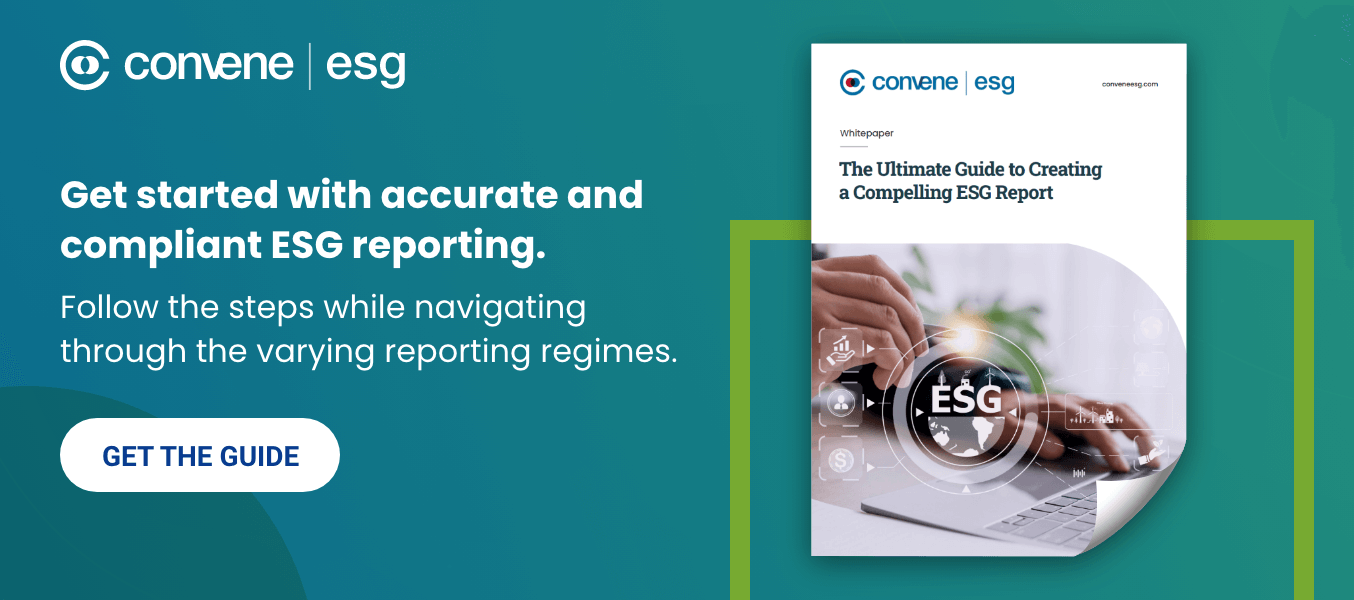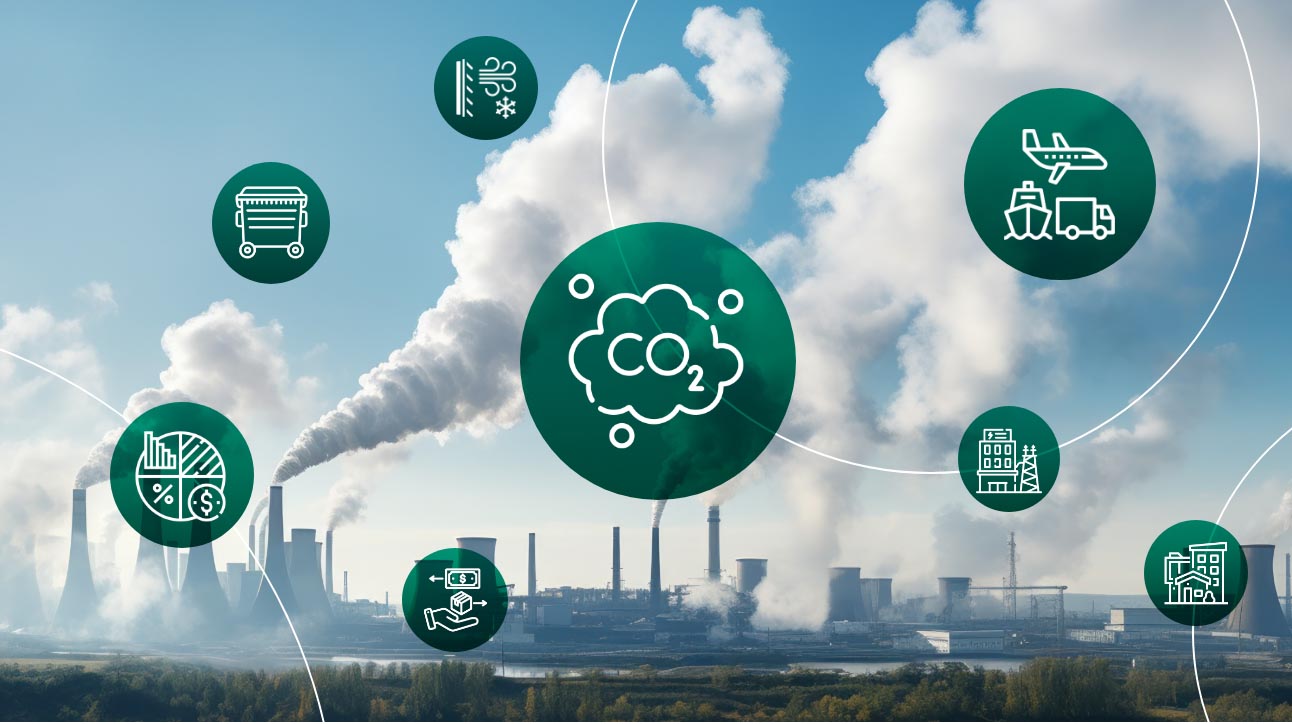In today’s corporate world, it’s no longer enough for investors and the public that companies deliver maximum returns and steady growth rates. Instead, an increasing number of stakeholders place a premium on entities that put environmental, social, and governance (ESG) issues at the heart of corporate policies, culture, and business practices.
For that reason, there’s been a noticeable rise in interest among stakeholders and executives regarding ESG compliance. If you’ve been wondering about ways to ensure your company exhibits compliance with the leading ESG reporting practices, read on to know how.
What is ESG compliance?
ESG compliance refers to the understanding of the ESG guidelines mandated by governmental and regulatory bodies, and the act of implementing them in internal policies and practices. It also involves the adherence to global frameworks and standards that guide toward sustainability. This way, companies can better demonstrate their credibility as a responsible and sustainable brand on the market.
Compliance guidelines for ESG (Environmental, Social, Governance) aspects can be extensive and may vary depending on the industry and standards. Here’s an overview of the common guidelines to comply with:
Environmental (E)
- Set industry-specific carbon reduction targets, aligned with global standards like the Greenhouse Gas Protocol (GHG Protocol) or commitments like Net-Zero 2050
- Integrate energy-efficient and water conservation policies into operations
- Regularly report environmental performance metrics (e.g. carbon footprint, waste generation, and water usage)
Social (S)
- Create and enforce policies on diversity and inclusion across all organisation levels
- Impose fair labour practices and ethical supply chain management, in adherence to international labour standards or conventions
- Engage in community outreach and philanthropy to support local social developments
Governance (G)
- Enforce a robust code of ethics and anti-corruption policies at all organisation levels
- Establish stakeholder engagement and participation, for transparency
- Carry out regular governance audits to deter potential corporate governance gaps or vulnerabilities
ESG Reporting Requirements
In Malaysia, the Capital Markets Malaysia (CMM) released a Simplified ESG Disclosure Guide (SEDG) to provide small-to-medium enterprises (SMEs) with a streamlined and standardised set of guidelines for ESG disclosures. The guide is also developed “to provide policy and principles-based standard setters with a set of ESG disclosures in support of their guidance.” Reporting requirements detailed in the guide are formulated from various standards like the GHG Protocol Corporate Standard.
For listed companies in Singapore, the Singapore Exchange (SGX) mandates certain requirements for sustainability disclosed, in which these primary components must be reported: (1) material ESG factors, (2) climate-related disclosures in line with the TCFD recommendations, (3) policies, practices and performance, (4) targets, (5) sustainability reporting framework, and (6) board statement and associated governance structure for sustainability practices.
Other countries and their stock exchanges regulate ESG disclosures for compliance. These include:
- US Securities and Exchange Commission (SEC)
- Stock Exchange of Hong Kong (HKEX)
- Bursa Malaysia
- Philippine Stock Exchange (PSE)
- Philippine Securities and Exchange Commission (SEC)
- EU’s Corporate Sustainability Reporting Directive (CSRD)
- UK’s Companies (Strategic Report) (Climate-related Financial Disclosure) Regulations 2022 and Limited Liability Partnerships (Climate-related Financial Disclosure) Regulations 2022
Globally Accepted Frameworks and Standards
Companies can choose from a wide range of ESG disclosure frameworks that function as broad sets of guidelines and standards for ESG compliance. They are specific in focus and lay out detailed criteria concerning information that must be disclosed. Some of the more common frameworks and standards include:
- The Global Reporting Initiative (GRI) Standards
- The Sustainability Accounting Standards Board (SASB)
- CDP (formerly the Carbon Disclosure Project)
- The Task Force on Climate-Related Financial Disclosures (TCFD)
- The United Nations Principles for Responsible Investment (UNPRI)
- GRESB (formerly the Global Real Estate Sustainability Benchmark)
- International Sustainability Standards Board (ISSB)
ESG Certifications
It’s often impossible to carry out ESG compliance checks for third parties, which can present a challenge for compliance teams. A solution can be found in ESG certifications. These are accreditations that guarantee an entity’s use of sustainable materials, which abide by anti-bribery and anti-forced and enslaved labour laws.
By choosing to work with certified third parties, you can prove to regulatory bodies that you’re making reasonable efforts to eliminate unsustainable practices and production, human rights violations, and other risks from your supply chains and essential production and service pipelines.
Is ESG compliance mandatory?
Given the growing concerns on environmental and social issues, and corporate governance, compliance for ESG is becoming more an obligation instead of something they can do in liberty. In particular, more countries are requiring disclosure of climate-related information.
For FY2023, the Singapore Exchange (SGX) began implementing mandatory climate reporting for certain industries in the country — including financial, agriculture, food, energy, and forest products. The mandate stretched to other industries (materials and building, and transportation) for FY2024.
But is complying with ESG mandates really beneficial for businesses? What can your company expect from being ESG compliant? Find out in the next section.
Six Benefits of ESG Compliance

At its most basic level, ESG compliance helps companies avoid legal and regulatory penalties imposed for failure to properly and accurately disclose sustainability data. However, it also offers advantages that can help your company become more competitive and profitable.
1. Improved Stakeholder Engagement
Through ESG compliance, you can produce reports that publicise efforts to reduce waste, minimise emissions and climate impacts, and eliminate violations of public trust and essential ethics laws. As such, ESG compliance can help you reach the stakeholders you most want to engage with and keep them apprised of your work in providing sustainable services and products.
2. Talent and Investor Attractiveness
Sustainability is an increasingly attractive feature for potential recruits and investors. One study revealed noticeably higher levels of employee satisfaction in companies with impressive ESG scores.
Similarly, investments in “sustainable mutual funds and ESG-focused exchange-traded funds rose globally by 53%” in 2022 “to $2.7 trillion”, while the value of ESG investments in 2021 climbed to $120 billion, more than double the value in 2020.
3. Enhanced Reputation and Competitive Advantage
In recent years, a matter of increasing concern for many organisations has been the risk of reputational damage incurred by working with unsustainable third parties. Companies can publicise their efforts to maintain ESG-compliant policies and sustainable supplier partnerships to promote their reputations as ESG-compliant entities.
This helps attract more investors and consumers and make a name as a company that operates within ethical standards. Hence, making it easier to leap ahead of the competition, particularly those that don’t commit to sustainable practices.
4. Stronger Financial Performance
Another benefit of ESG compliance is that it can contribute to a company’s positive financial performance. Studies suggest that ESG is related to lower capital costs and stock performance. If done right, sustainability efforts can drive operational and financial value.
Well-planned efforts and compliant ESG reports can be strategic tools to counter rising operating expenses (e.g. raw material costs) which impact over 60% of operational profits, according to McKinsey. This is in relation to ESG-compliant practices, such as resource efficiency and water or energy conservation, leading to operational efficiencies and cost savings.
5. Better Risk Management
Focusing on ESG compliance is known to contribute to long-term resilience. Companies become more prepared in various aspects, including the ever-changing environmental regulations, market conditions, societal expectations, and regulations.
Aligning ESG compliance with risk management practices means fending off risks that can impact one’s reputation. One example of these risks is carbon contribution and resource depletion, which can result in fines or increase unnecessary operational costs. Companies that report on carbon emissions are more likely to be equipped to navigate environmental regulations.
Overall, ESG-compliant organisations are less likely to be exposed to operational and reputational risks, and can better position themselves for sustained success.
6. Path to Green Innovation
Compliance with ESG also gives way for companies to recognise green innovation. As its name suggests, green innovation merges the significance of environmental protection and technological innovation. Its context targets the effective use of natural resources, while employing green technologies. A few examples are:
- Green buildings — Using eco-friendly design and construction to improve air quality, and reduce water and energy waste. Include green roofs, sustainable and recycled materials, and energy-efficient systems or appliances.
- Solar-powered desalination — Aiming to produce fresh drinking water using solar-thermal energy (by desalinating salt water). Hence, preventing water shortages and even desertification.
- Vertical farming — A new agricultural method of planting crops on top of each other, instead of in traditional horizontal rows. This farming technique utilises less space and water and is less likely to require chemical pesticides.
How to be an ESG-Compliant Organisation
ESG compliance means operating responsibly and sustainably in practice. Besides the obvious environmental perks, companies also do it to avoid legal repercussions and costs. This, however, goes beyond installing solar-powered tech or investing in green construction. Here’s an ESG compliance checklist to get you started.
1. Set the right ESG goals and roadmaps
Aligning business priorities with ESG reporting requirements is a good foundation for setting up the right strategy. Start with a few high-level ESG goals then input different targets for each objective. Not sure how to start? Conducting materiality and baseline assessments is recommended to identify areas that you need to focus on.
Next, create your ESG strategy roadmap detailing how to specifically achieve each of your goals. It should be a phased plan with key action points, workflows, and deliverables. This may also outline short- and long-term objections to success.
2. Stay up-to-date on the latest standards and frameworks
Standards and regulations on ESG are constantly changing, and keeping track of them is imperative. This helps ensure you’re adhering to its legal obligations without missing reporting deadlines your company would be subject to.
Also, opt for the right frameworks (SASB, GRI, and so on), which methodologies you can use to measure and report your ESG data. Choosing the right standards and frameworks depends on various factors, such as business risk appetite and industry relevance.
Having an EGS consultant on your side ensures you’re guided in picking the most appropriate standards or frameworks to adopt. They can assist with materiality assessment, gap analysis, and eventually, implementation roadmap. Learn more about why you should hire an ESG consultant in this article.
3. Effectively manage ESG data and metrics
Managing climate-related data is a vital part of ESG compliance. Gathering them, however, is the tricky part. For an efficient process, make sure to first identify ESG metrics that are most relevant to your business and industry. These may include:
- Environmental metrics — GHG emissions, energy usage, water output, and nature use.
- Social metrics — Diversity, equity, and inclusion (DEI) percentage, labour practices or pay gaps, and charity or philanthropy.
- Governance metrics — Anti-corruption policies, board diversity, and executive’s pay ratio compared to the average employee.
Using proper data collection methods is also necessary, which often includes audits and direct measurement. Having a centralized data repository like what Convene ESG offers is highly advisable for accurate collection and secure storage and access. Using ESG compliance software and reporting platforms can reduce human error and better track data.
What’s Next for ESG Compliance
As new waves of ESG regulations constantly spring up, companies are expected to comply with greater accountability and transparency. The ISSB setting a global baseline for ESG reporting by releasing its first two standards (IFRS S1 and IFRS S2), which are both voluntary. The standards are to become effective on or after 1 January 2024, with Asia Pacific and EU jurisdictions likely to adopt them by 2025.
The Hong Kong Exchanges and Clearing (HKEX), for one, plans to align with the new ISSB standards, involving new mandatory disclosures that replace its current “comply or explain” system. Singapore is also taking a phased approach to move into mandatory climate reporting.
In general, regulatory bodies in the US, EU, and Asia Pacific plan to move sustainability disclosures from voluntary to mandatory. That said, businesses are expected to continue meeting ESG reporting requirements, while proactively adjusting their strategies.
Four Resources to Help You with ESG Compliance
If your company is still new to the field and needs help staying compliant, here are four ESG resources to consider:
- ESG consultants — Offering extensive ESG knowledge, you can have a better understanding of how to manage and report your company’s material ESG issues. These consultants help businesses implement sustainable practices and reduce their carbon footprint.
- Industry associations — Organisations like the United Nations Global Compact (UNGC) use their influence to promote ESG integration and spearhead climate campaigns. Aligning with their principles can companies kick off their sustainability plans, and eventually, become compliant with global standards.
- Online resources — Understanding the importance of ESG compliance and putting it into practice are now made easier with widely available resources and courses online. Learning programs for things like waste treatment or raw material usage, and news on the latest regulatory updates can now be accessed almost instantly.
- ESG reporting and compliance software — Reporting and ESG compliance software like Convene ESG is designed to help companies manage and create reports on climate-related data — all while ensuring adherence to the latest regulations and standards. By automating such tasks, working with large data sets won’t be as daunting and time-consuming. Check out our guide on how to choose the right ESG reporting software.
Achieve ESG Compliance Now with Convene ESG

The initial hurdles of ESG compliance can be overwhelming, particularly for companies without the relevant expertise and tools. With Convene ESG, meeting ESG reporting requirements and standards can be a piece of cake.
Automated data consolidation, real-time tracking, and compliant report generation are what make Convene ESG the perfect partner to set your sustainability journey in motion. Users also get access to customisable dashboards and benchmarking tools for deep-dive oversight and analysis.
Talk to our specialists and request a demo to find out how Convene ESG can ensure consistent ESG compliance.
Monica joined the ESG industry as a Sustainability Associate for Business for Sustainable Development (BSD), one of the pioneers of corporate sustainability in the Philippines. There, she was able to deep dive into the field, helping clients in the local market adopt sustainability into their core business through sustainability strategy/roadmap building and report writing. Apart from sustainability, Monica has experience in entrepreneurship, partaking in small businesses since her years in college. She graduated from Ateneo de Manila University with a Bachelor of Arts in Management Economics, and a minor in Sustainability in 2019.















